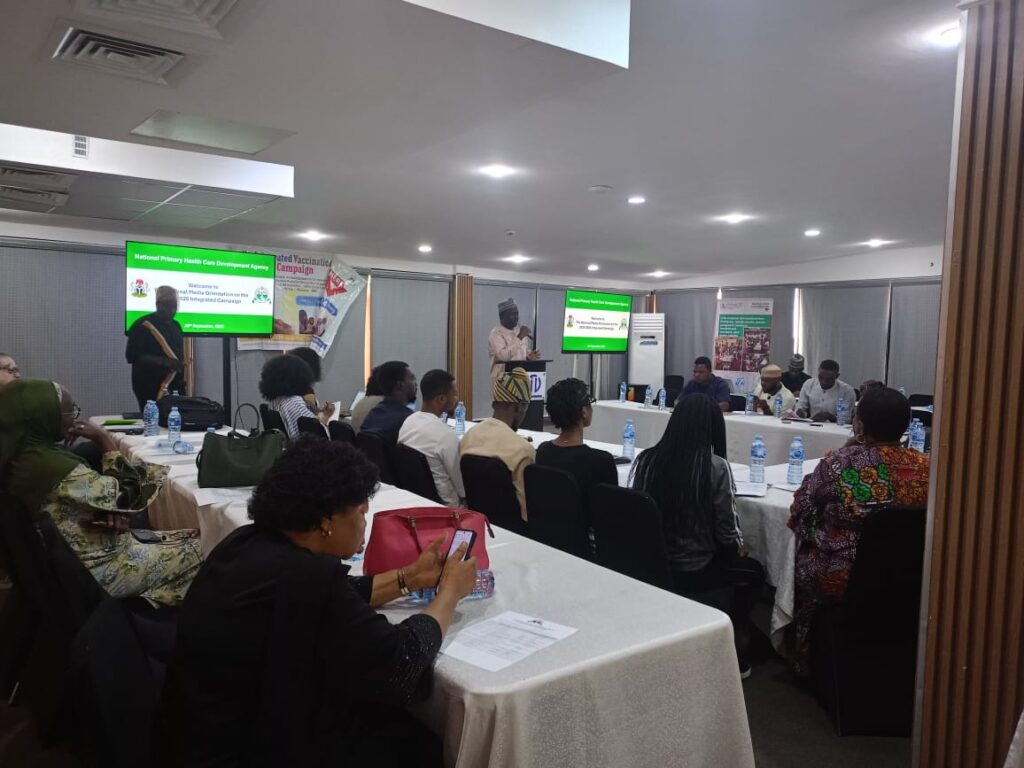The Federal Government has announced the introduction of the Measles-Rubella (MR) vaccine into Nigeria’s routine immunisation schedule, as part of efforts to strengthen childhood immunity and curb the spread of preventable diseases.
Executive Director of the National Primary Healthcare Development Agency (NPHCDA), Dr. Muyi Aina, disclosed this at a National Media Orientation on the 2025/2026 Integrated Measles-Rubella Campaign held at the weekend in Abuja. He described the campaign, scheduled to be launched on 6 October 2025, as the largest health campaign in Africa.
Represented by the Director of Advocacy and Communication at the Agency, Dr. Ladan Aliyu, Aina explained that the integration of the MR vaccine will replace the standalone measles vaccine and offer dual protection against measles and rubella, two highly contagious viral infections that pose serious health risks to children.
He noted that the initiative aligns with global best practices recommended by the World Health Organisation (WHO) and is expected to accelerate Nigeria’s progress toward eliminating measles and rubella by 2030, while also tackling polio, nutrition, HPV, routine immunisation, malaria, and Neglected Tropical Diseases (NTDs).
“Nigeria is preparing for a health campaign starting in October 2025. It is going to be a model of all campaigns, the largest in the history of Africa. This campaign will also signal the introduction of the measles-rubella vaccine into Nigeria’s routine immunization,” Aina said.
The campaign will integrate several life-saving vaccines, including routine immunisation for children aged 0–23 months, measles-rubella vaccines for children aged 9 months–14 years, HPV vaccines for adolescent girls, and polio vaccines for children aged 0–59 months.
Aina stressed that a single MR vaccine dose provides lasting protection, saves lives, and builds healthier communities. He added that the campaign would be conducted in phases, beginning with 21 states, and would feature routine immunisation for children from birth to 23 months.
While describing the media as critical partners in ensuring the success of the campaign, he cautioned against misinformation, which he said remains one of the biggest threats to vaccine rollout.
“We are not saying the media propagate rumors, but you are indispensable partners in countering misinformation. Your role is to provide accurate information on the benefits of vaccination, as you have done in the past,” he stated.
Non-Polio SIAs Consultant with AFENET, Dr. Frank Obi, described the introduction of the MR vaccine as timely, noting that measles and rubella remain significant public health threats in Nigeria. According to him, the campaign targets 63 million children aged 9 months to under 15 years in phase one, and 43 million in phase two, with a goal of achieving 95% coverage across implementing states to build herd immunity.
Obi assured parents of the safety of the MR vaccine, explaining that it is made from a weakened form of the virus that cannot cause illness but trains the body to fight future infections.
He noted that some children may experience mild side effects such as fever or rash, which usually disappear within a few days.
“Every vaccination team is fully equipped to manage any adverse events, no matter how minor,” he said.
Obi also revealed that the house-to-house approach would not be adopted due to high costs. Instead, vaccinations will be provided at schools, markets, worship centres, and community hubs.
UNICEF Health Manager for Immunization, Shaikh Kabir, described the campaign as one of the most ambitious public health interventions in Nigeria’s history.
“This is a historic opportunity for Nigerian children. All children aged 9 to 14 years will receive the measles-rubella vaccine to shield them from these killer diseases, while under-five children will also receive polio vaccines,” Kabir said.
He urged the media to help drive public demand for vaccines, adding that their role is “paramount in building awareness, countering misinformation, and strengthening community trust.”
AFENET’s Vaccine Preventable Diseases Surveillance Consultant, Dr. Baffa Ibrahim, highlighted the dangers of rubella and its under-reporting due to gaps in laboratory testing. He warned that rubella infection during pregnancy can lead to irreversible congenital defects.
“In 2024, the global burden of Congenital Rubella Syndrome (CRS) remains a major concern, with around 100,000 babies born with CRS annually. Limited surveillance masks the true burden of rubella in Nigeria, but seroprevalence studies have confirmed high susceptibility among women of childbearing age,” he explained.
He added that the MR vaccine provides dual benefits, sustaining measles control while preventing rubella and CRS and is therefore critical for protecting girls of childbearing age and preventing birth defects.
Coordinator of Communications and Advocacy at the Nigerian Red Cross Society, Chima Nwankwo, urged the media to highlight real-life community experiences to inspire public trust.
“Immunization is a lifelong investment for children. It prevents needless illnesses, reduces disease burden, and increases life expectancy. The media sets the agenda. If you capture parents’ experiences and show how vaccination is saving lives, others will follow,” Nwankwo said.
Director of Community Health Services at NPHCDA, Dr. Nana Sandah-Abubakar, underscored the importance of collaboration in ensuring a successful campaign.
“Health is everybody’s business. Having the right information is the first step to taking the right actions and correcting any misinformation that might occur. The awareness that this activity is taking place will guarantee we reach the right targets and encourage participation,” she said.














